Australian Consumer Law Case Study 2022
VerifiedAdded on 2022/09/22
|12
|2877
|23
AI Summary
Contribute Materials
Your contribution can guide someone’s learning journey. Share your
documents today.
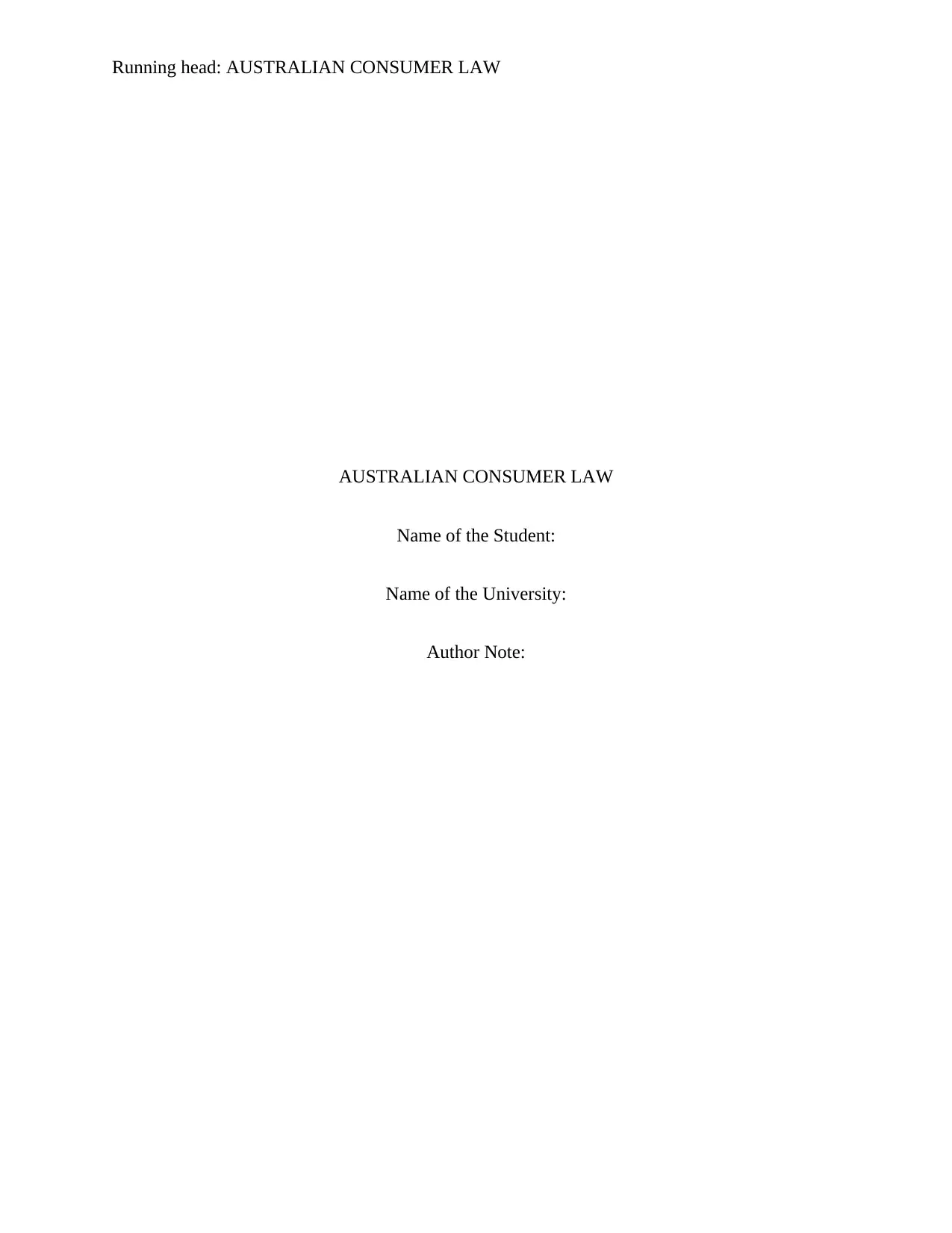
Running head: AUSTRALIAN CONSUMER LAW
AUSTRALIAN CONSUMER LAW
Name of the Student:
Name of the University:
Author Note:
AUSTRALIAN CONSUMER LAW
Name of the Student:
Name of the University:
Author Note:
Secure Best Marks with AI Grader
Need help grading? Try our AI Grader for instant feedback on your assignments.
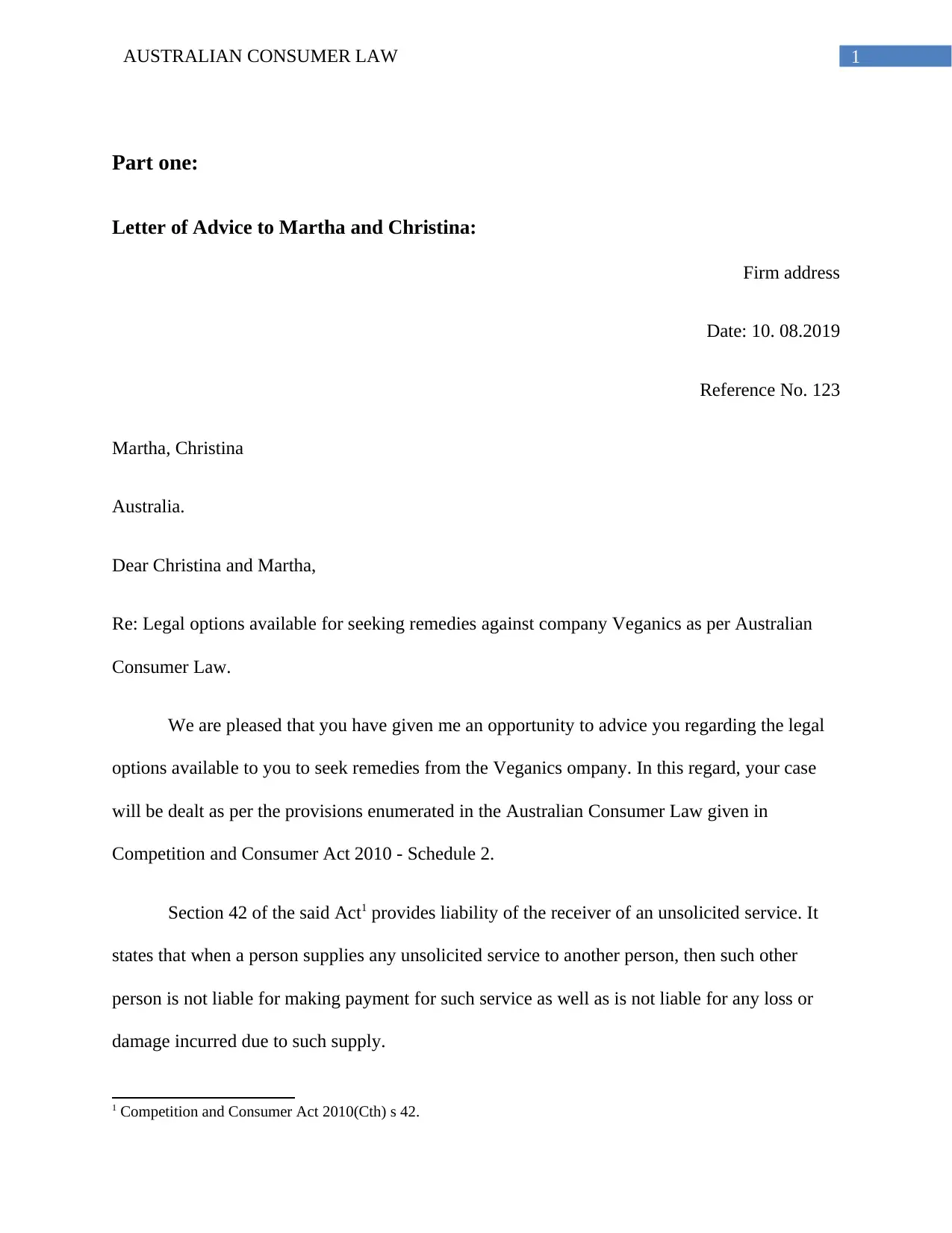
1AUSTRALIAN CONSUMER LAW
Part one:
Letter of Advice to Martha and Christina:
Firm address
Date: 10. 08.2019
Reference No. 123
Martha, Christina
Australia.
Dear Christina and Martha,
Re: Legal options available for seeking remedies against company Veganics as per Australian
Consumer Law.
We are pleased that you have given me an opportunity to advice you regarding the legal
options available to you to seek remedies from the Veganics ompany. In this regard, your case
will be dealt as per the provisions enumerated in the Australian Consumer Law given in
Competition and Consumer Act 2010 - Schedule 2.
Section 42 of the said Act1 provides liability of the receiver of an unsolicited service. It
states that when a person supplies any unsolicited service to another person, then such other
person is not liable for making payment for such service as well as is not liable for any loss or
damage incurred due to such supply.
1 Competition and Consumer Act 2010(Cth) s 42.
Part one:
Letter of Advice to Martha and Christina:
Firm address
Date: 10. 08.2019
Reference No. 123
Martha, Christina
Australia.
Dear Christina and Martha,
Re: Legal options available for seeking remedies against company Veganics as per Australian
Consumer Law.
We are pleased that you have given me an opportunity to advice you regarding the legal
options available to you to seek remedies from the Veganics ompany. In this regard, your case
will be dealt as per the provisions enumerated in the Australian Consumer Law given in
Competition and Consumer Act 2010 - Schedule 2.
Section 42 of the said Act1 provides liability of the receiver of an unsolicited service. It
states that when a person supplies any unsolicited service to another person, then such other
person is not liable for making payment for such service as well as is not liable for any loss or
damage incurred due to such supply.
1 Competition and Consumer Act 2010(Cth) s 42.
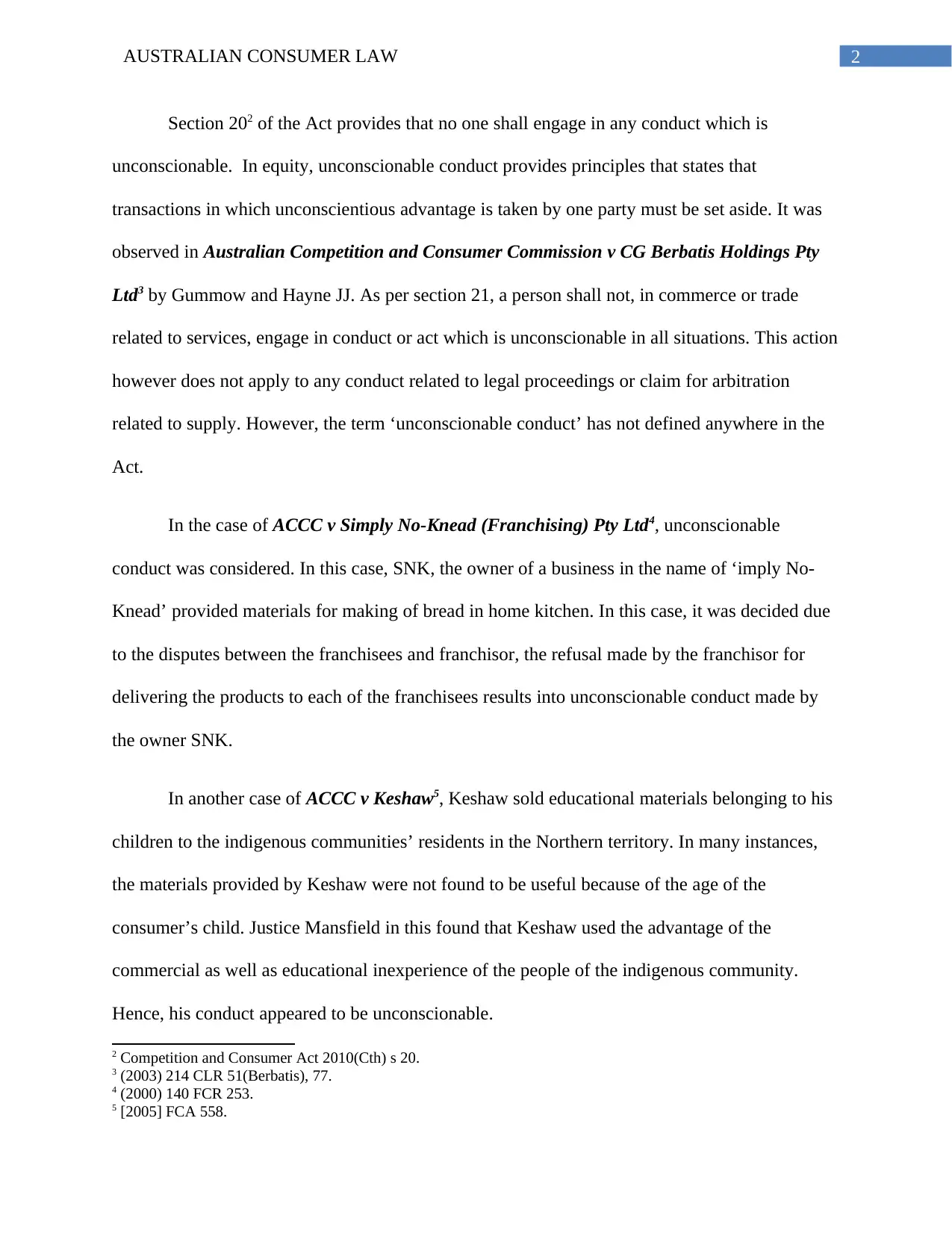
2AUSTRALIAN CONSUMER LAW
Section 202 of the Act provides that no one shall engage in any conduct which is
unconscionable. In equity, unconscionable conduct provides principles that states that
transactions in which unconscientious advantage is taken by one party must be set aside. It was
observed in Australian Competition and Consumer Commission v CG Berbatis Holdings Pty
Ltd3 by Gummow and Hayne JJ. As per section 21, a person shall not, in commerce or trade
related to services, engage in conduct or act which is unconscionable in all situations. This action
however does not apply to any conduct related to legal proceedings or claim for arbitration
related to supply. However, the term ‘unconscionable conduct’ has not defined anywhere in the
Act.
In the case of ACCC v Simply No-Knead (Franchising) Pty Ltd4, unconscionable
conduct was considered. In this case, SNK, the owner of a business in the name of ‘imply No-
Knead’ provided materials for making of bread in home kitchen. In this case, it was decided due
to the disputes between the franchisees and franchisor, the refusal made by the franchisor for
delivering the products to each of the franchisees results into unconscionable conduct made by
the owner SNK.
In another case of ACCC v Keshaw5, Keshaw sold educational materials belonging to his
children to the indigenous communities’ residents in the Northern territory. In many instances,
the materials provided by Keshaw were not found to be useful because of the age of the
consumer’s child. Justice Mansfield in this found that Keshaw used the advantage of the
commercial as well as educational inexperience of the people of the indigenous community.
Hence, his conduct appeared to be unconscionable.
2 Competition and Consumer Act 2010(Cth) s 20.
3 (2003) 214 CLR 51(Berbatis), 77.
4 (2000) 140 FCR 253.
5 [2005] FCA 558.
Section 202 of the Act provides that no one shall engage in any conduct which is
unconscionable. In equity, unconscionable conduct provides principles that states that
transactions in which unconscientious advantage is taken by one party must be set aside. It was
observed in Australian Competition and Consumer Commission v CG Berbatis Holdings Pty
Ltd3 by Gummow and Hayne JJ. As per section 21, a person shall not, in commerce or trade
related to services, engage in conduct or act which is unconscionable in all situations. This action
however does not apply to any conduct related to legal proceedings or claim for arbitration
related to supply. However, the term ‘unconscionable conduct’ has not defined anywhere in the
Act.
In the case of ACCC v Simply No-Knead (Franchising) Pty Ltd4, unconscionable
conduct was considered. In this case, SNK, the owner of a business in the name of ‘imply No-
Knead’ provided materials for making of bread in home kitchen. In this case, it was decided due
to the disputes between the franchisees and franchisor, the refusal made by the franchisor for
delivering the products to each of the franchisees results into unconscionable conduct made by
the owner SNK.
In another case of ACCC v Keshaw5, Keshaw sold educational materials belonging to his
children to the indigenous communities’ residents in the Northern territory. In many instances,
the materials provided by Keshaw were not found to be useful because of the age of the
consumer’s child. Justice Mansfield in this found that Keshaw used the advantage of the
commercial as well as educational inexperience of the people of the indigenous community.
Hence, his conduct appeared to be unconscionable.
2 Competition and Consumer Act 2010(Cth) s 20.
3 (2003) 214 CLR 51(Berbatis), 77.
4 (2000) 140 FCR 253.
5 [2005] FCA 558.
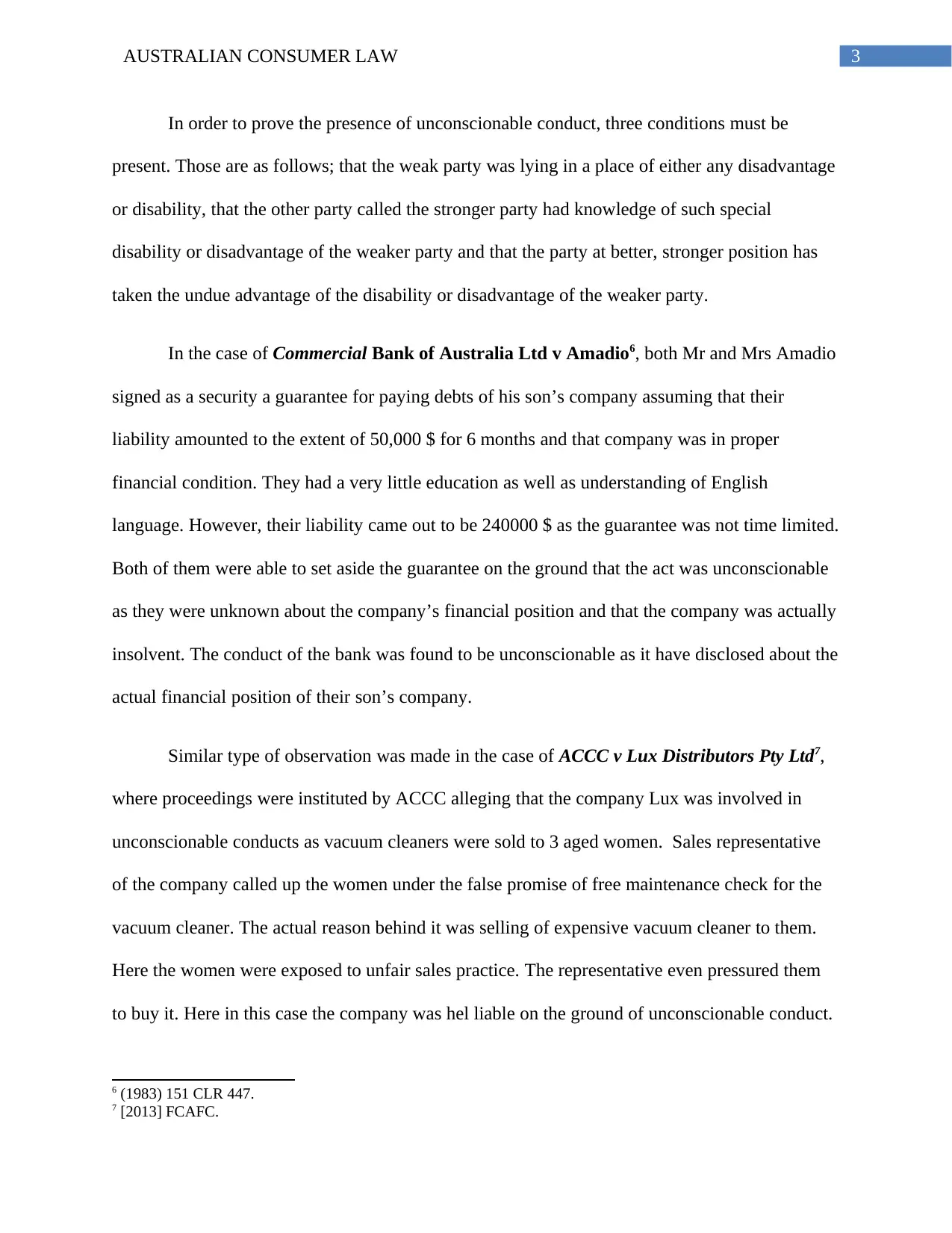
3AUSTRALIAN CONSUMER LAW
In order to prove the presence of unconscionable conduct, three conditions must be
present. Those are as follows; that the weak party was lying in a place of either any disadvantage
or disability, that the other party called the stronger party had knowledge of such special
disability or disadvantage of the weaker party and that the party at better, stronger position has
taken the undue advantage of the disability or disadvantage of the weaker party.
In the case of Commercial Bank of Australia Ltd v Amadio6, both Mr and Mrs Amadio
signed as a security a guarantee for paying debts of his son’s company assuming that their
liability amounted to the extent of 50,000 $ for 6 months and that company was in proper
financial condition. They had a very little education as well as understanding of English
language. However, their liability came out to be 240000 $ as the guarantee was not time limited.
Both of them were able to set aside the guarantee on the ground that the act was unconscionable
as they were unknown about the company’s financial position and that the company was actually
insolvent. The conduct of the bank was found to be unconscionable as it have disclosed about the
actual financial position of their son’s company.
Similar type of observation was made in the case of ACCC v Lux Distributors Pty Ltd7,
where proceedings were instituted by ACCC alleging that the company Lux was involved in
unconscionable conducts as vacuum cleaners were sold to 3 aged women. Sales representative
of the company called up the women under the false promise of free maintenance check for the
vacuum cleaner. The actual reason behind it was selling of expensive vacuum cleaner to them.
Here the women were exposed to unfair sales practice. The representative even pressured them
to buy it. Here in this case the company was hel liable on the ground of unconscionable conduct.
6 (1983) 151 CLR 447.
7 [2013] FCAFC.
In order to prove the presence of unconscionable conduct, three conditions must be
present. Those are as follows; that the weak party was lying in a place of either any disadvantage
or disability, that the other party called the stronger party had knowledge of such special
disability or disadvantage of the weaker party and that the party at better, stronger position has
taken the undue advantage of the disability or disadvantage of the weaker party.
In the case of Commercial Bank of Australia Ltd v Amadio6, both Mr and Mrs Amadio
signed as a security a guarantee for paying debts of his son’s company assuming that their
liability amounted to the extent of 50,000 $ for 6 months and that company was in proper
financial condition. They had a very little education as well as understanding of English
language. However, their liability came out to be 240000 $ as the guarantee was not time limited.
Both of them were able to set aside the guarantee on the ground that the act was unconscionable
as they were unknown about the company’s financial position and that the company was actually
insolvent. The conduct of the bank was found to be unconscionable as it have disclosed about the
actual financial position of their son’s company.
Similar type of observation was made in the case of ACCC v Lux Distributors Pty Ltd7,
where proceedings were instituted by ACCC alleging that the company Lux was involved in
unconscionable conducts as vacuum cleaners were sold to 3 aged women. Sales representative
of the company called up the women under the false promise of free maintenance check for the
vacuum cleaner. The actual reason behind it was selling of expensive vacuum cleaner to them.
Here the women were exposed to unfair sales practice. The representative even pressured them
to buy it. Here in this case the company was hel liable on the ground of unconscionable conduct.
6 (1983) 151 CLR 447.
7 [2013] FCAFC.
Secure Best Marks with AI Grader
Need help grading? Try our AI Grader for instant feedback on your assignments.
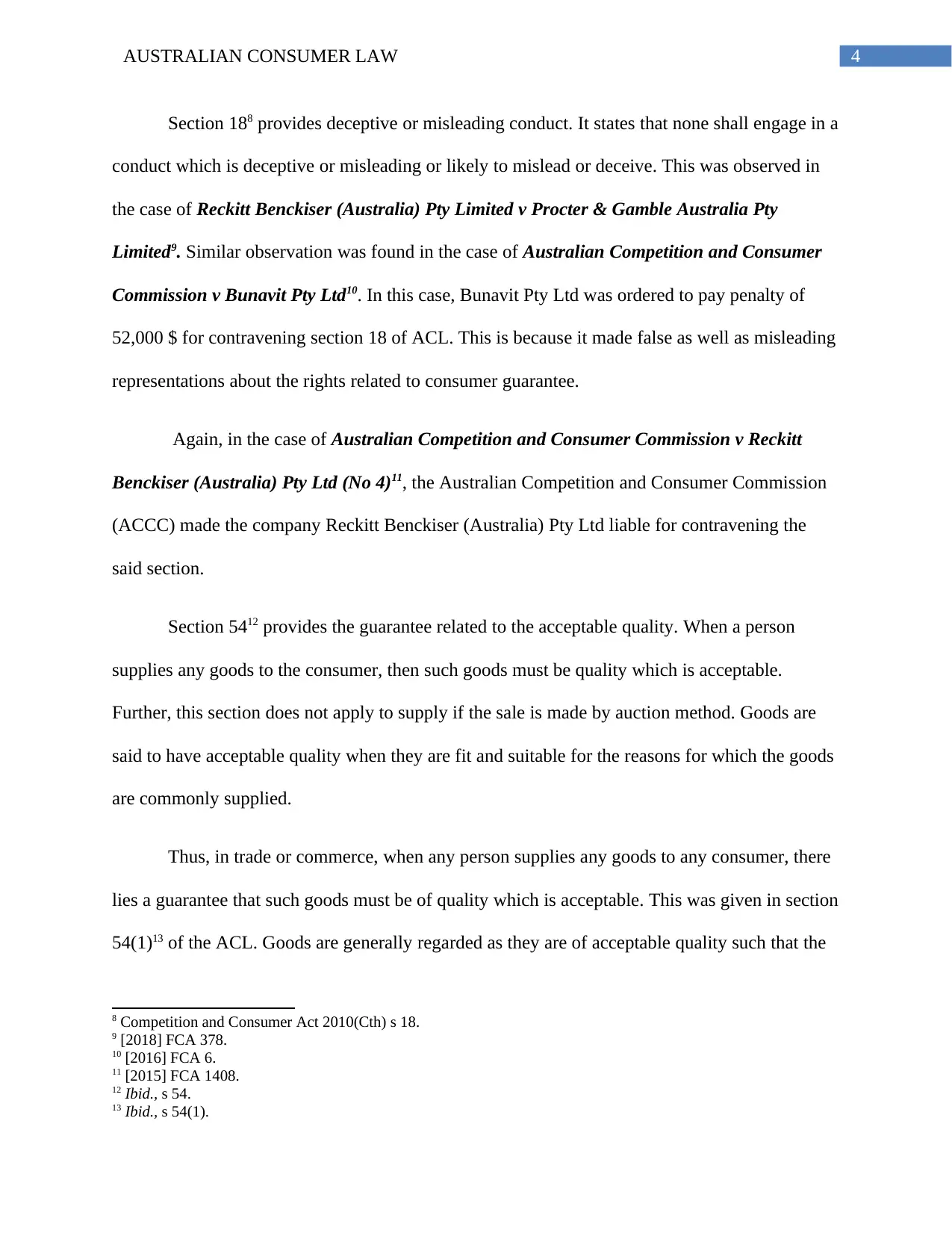
4AUSTRALIAN CONSUMER LAW
Section 188 provides deceptive or misleading conduct. It states that none shall engage in a
conduct which is deceptive or misleading or likely to mislead or deceive. This was observed in
the case of Reckitt Benckiser (Australia) Pty Limited v Procter & Gamble Australia Pty
Limited9. Similar observation was found in the case of Australian Competition and Consumer
Commission v Bunavit Pty Ltd10. In this case, Bunavit Pty Ltd was ordered to pay penalty of
52,000 $ for contravening section 18 of ACL. This is because it made false as well as misleading
representations about the rights related to consumer guarantee.
Again, in the case of Australian Competition and Consumer Commission v Reckitt
Benckiser (Australia) Pty Ltd (No 4)11, the Australian Competition and Consumer Commission
(ACCC) made the company Reckitt Benckiser (Australia) Pty Ltd liable for contravening the
said section.
Section 5412 provides the guarantee related to the acceptable quality. When a person
supplies any goods to the consumer, then such goods must be quality which is acceptable.
Further, this section does not apply to supply if the sale is made by auction method. Goods are
said to have acceptable quality when they are fit and suitable for the reasons for which the goods
are commonly supplied.
Thus, in trade or commerce, when any person supplies any goods to any consumer, there
lies a guarantee that such goods must be of quality which is acceptable. This was given in section
54(1)13 of the ACL. Goods are generally regarded as they are of acceptable quality such that the
8 Competition and Consumer Act 2010(Cth) s 18.
9 [2018] FCA 378.
10 [2016] FCA 6.
11 [2015] FCA 1408.
12 Ibid., s 54.
13 Ibid., s 54(1).
Section 188 provides deceptive or misleading conduct. It states that none shall engage in a
conduct which is deceptive or misleading or likely to mislead or deceive. This was observed in
the case of Reckitt Benckiser (Australia) Pty Limited v Procter & Gamble Australia Pty
Limited9. Similar observation was found in the case of Australian Competition and Consumer
Commission v Bunavit Pty Ltd10. In this case, Bunavit Pty Ltd was ordered to pay penalty of
52,000 $ for contravening section 18 of ACL. This is because it made false as well as misleading
representations about the rights related to consumer guarantee.
Again, in the case of Australian Competition and Consumer Commission v Reckitt
Benckiser (Australia) Pty Ltd (No 4)11, the Australian Competition and Consumer Commission
(ACCC) made the company Reckitt Benckiser (Australia) Pty Ltd liable for contravening the
said section.
Section 5412 provides the guarantee related to the acceptable quality. When a person
supplies any goods to the consumer, then such goods must be quality which is acceptable.
Further, this section does not apply to supply if the sale is made by auction method. Goods are
said to have acceptable quality when they are fit and suitable for the reasons for which the goods
are commonly supplied.
Thus, in trade or commerce, when any person supplies any goods to any consumer, there
lies a guarantee that such goods must be of quality which is acceptable. This was given in section
54(1)13 of the ACL. Goods are generally regarded as they are of acceptable quality such that the
8 Competition and Consumer Act 2010(Cth) s 18.
9 [2018] FCA 378.
10 [2016] FCA 6.
11 [2015] FCA 1408.
12 Ibid., s 54.
13 Ibid., s 54(1).
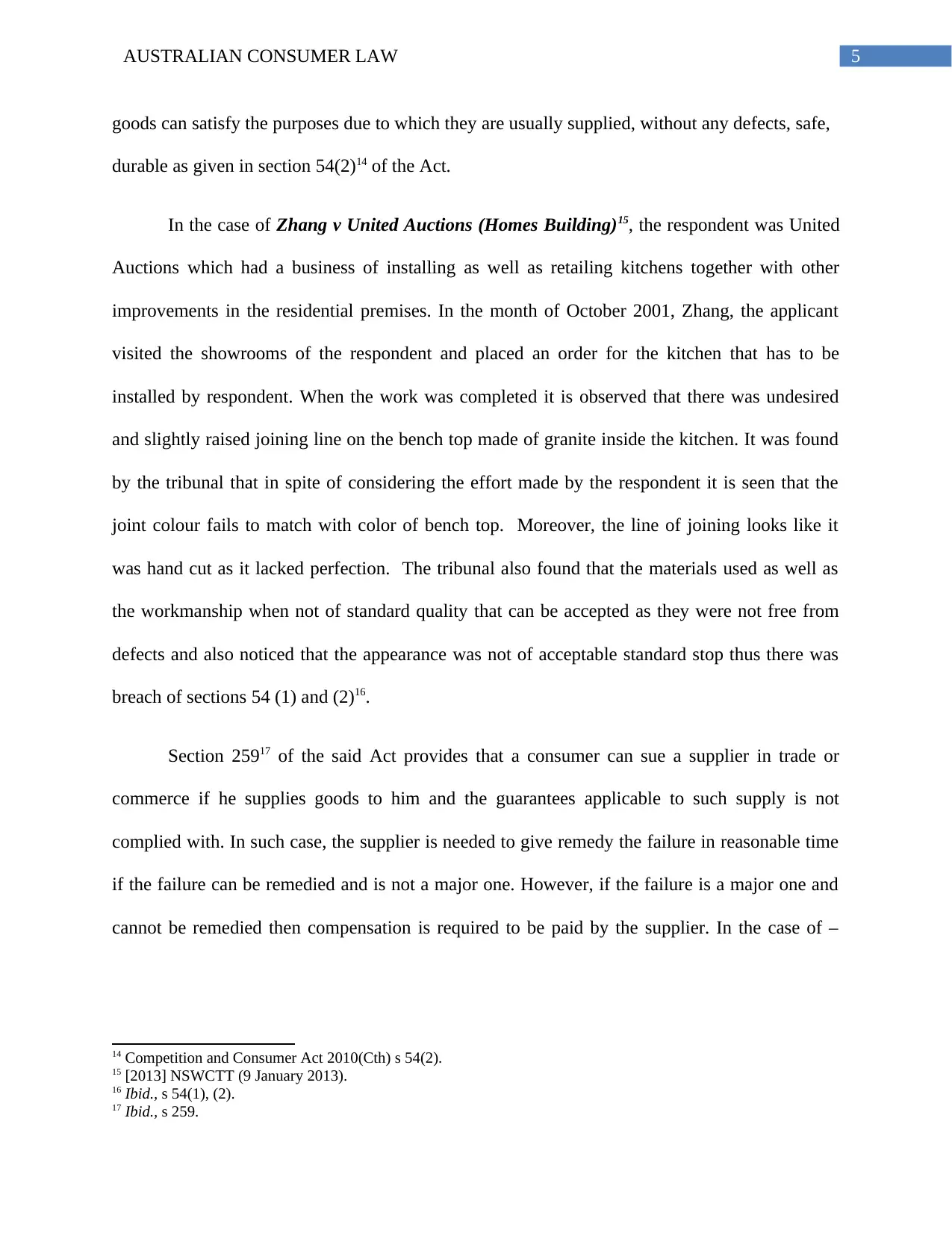
5AUSTRALIAN CONSUMER LAW
goods can satisfy the purposes due to which they are usually supplied, without any defects, safe,
durable as given in section 54(2)14 of the Act.
In the case of Zhang v United Auctions (Homes Building)15, the respondent was United
Auctions which had a business of installing as well as retailing kitchens together with other
improvements in the residential premises. In the month of October 2001, Zhang, the applicant
visited the showrooms of the respondent and placed an order for the kitchen that has to be
installed by respondent. When the work was completed it is observed that there was undesired
and slightly raised joining line on the bench top made of granite inside the kitchen. It was found
by the tribunal that in spite of considering the effort made by the respondent it is seen that the
joint colour fails to match with color of bench top. Moreover, the line of joining looks like it
was hand cut as it lacked perfection. The tribunal also found that the materials used as well as
the workmanship when not of standard quality that can be accepted as they were not free from
defects and also noticed that the appearance was not of acceptable standard stop thus there was
breach of sections 54 (1) and (2)16.
Section 25917 of the said Act provides that a consumer can sue a supplier in trade or
commerce if he supplies goods to him and the guarantees applicable to such supply is not
complied with. In such case, the supplier is needed to give remedy the failure in reasonable time
if the failure can be remedied and is not a major one. However, if the failure is a major one and
cannot be remedied then compensation is required to be paid by the supplier. In the case of –
14 Competition and Consumer Act 2010(Cth) s 54(2).
15 [2013] NSWCTT (9 January 2013).
16 Ibid., s 54(1), (2).
17 Ibid., s 259.
goods can satisfy the purposes due to which they are usually supplied, without any defects, safe,
durable as given in section 54(2)14 of the Act.
In the case of Zhang v United Auctions (Homes Building)15, the respondent was United
Auctions which had a business of installing as well as retailing kitchens together with other
improvements in the residential premises. In the month of October 2001, Zhang, the applicant
visited the showrooms of the respondent and placed an order for the kitchen that has to be
installed by respondent. When the work was completed it is observed that there was undesired
and slightly raised joining line on the bench top made of granite inside the kitchen. It was found
by the tribunal that in spite of considering the effort made by the respondent it is seen that the
joint colour fails to match with color of bench top. Moreover, the line of joining looks like it
was hand cut as it lacked perfection. The tribunal also found that the materials used as well as
the workmanship when not of standard quality that can be accepted as they were not free from
defects and also noticed that the appearance was not of acceptable standard stop thus there was
breach of sections 54 (1) and (2)16.
Section 25917 of the said Act provides that a consumer can sue a supplier in trade or
commerce if he supplies goods to him and the guarantees applicable to such supply is not
complied with. In such case, the supplier is needed to give remedy the failure in reasonable time
if the failure can be remedied and is not a major one. However, if the failure is a major one and
cannot be remedied then compensation is required to be paid by the supplier. In the case of –
14 Competition and Consumer Act 2010(Cth) s 54(2).
15 [2013] NSWCTT (9 January 2013).
16 Ibid., s 54(1), (2).
17 Ibid., s 259.
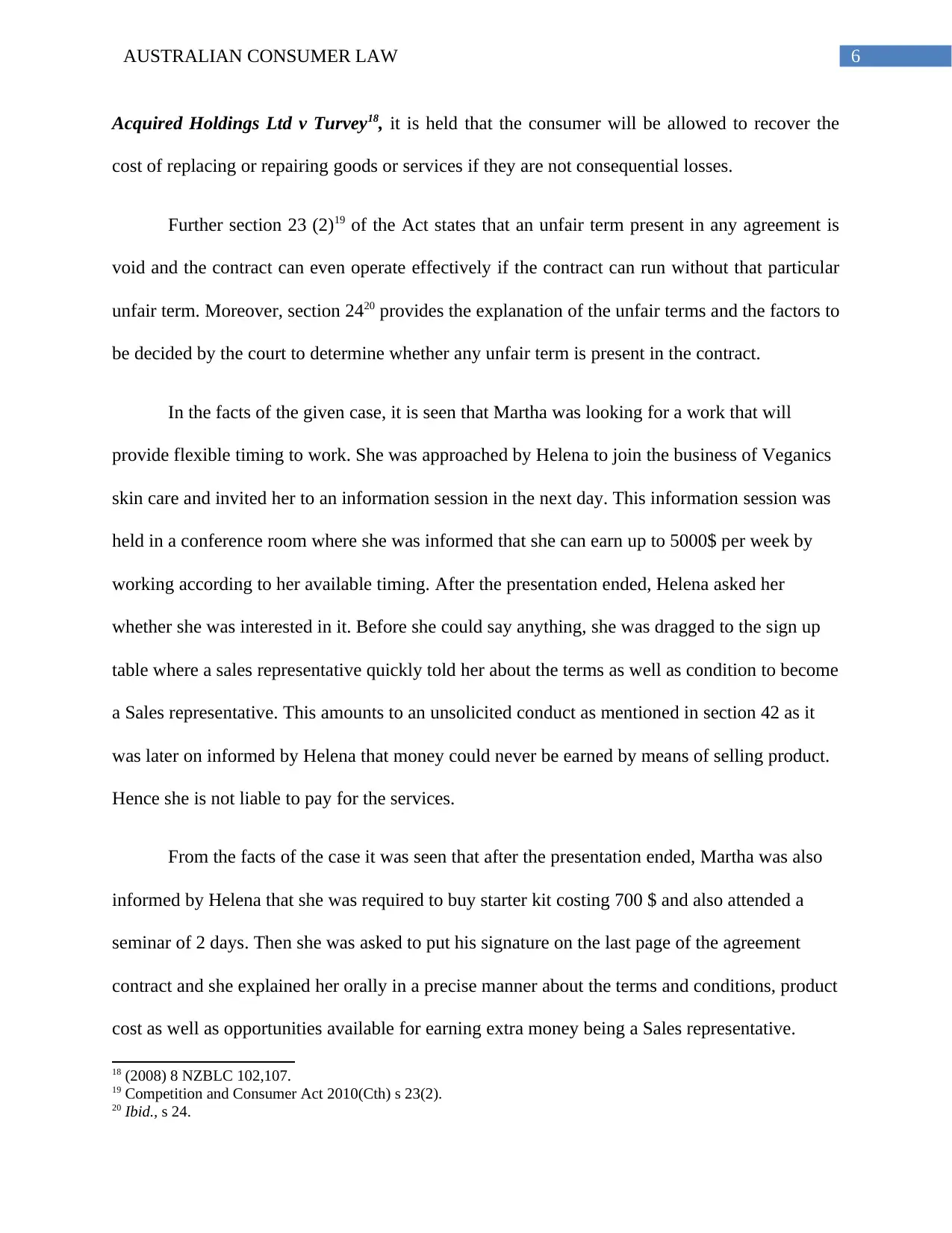
6AUSTRALIAN CONSUMER LAW
Acquired Holdings Ltd v Turvey18, it is held that the consumer will be allowed to recover the
cost of replacing or repairing goods or services if they are not consequential losses.
Further section 23 (2)19 of the Act states that an unfair term present in any agreement is
void and the contract can even operate effectively if the contract can run without that particular
unfair term. Moreover, section 2420 provides the explanation of the unfair terms and the factors to
be decided by the court to determine whether any unfair term is present in the contract.
In the facts of the given case, it is seen that Martha was looking for a work that will
provide flexible timing to work. She was approached by Helena to join the business of Veganics
skin care and invited her to an information session in the next day. This information session was
held in a conference room where she was informed that she can earn up to 5000$ per week by
working according to her available timing. After the presentation ended, Helena asked her
whether she was interested in it. Before she could say anything, she was dragged to the sign up
table where a sales representative quickly told her about the terms as well as condition to become
a Sales representative. This amounts to an unsolicited conduct as mentioned in section 42 as it
was later on informed by Helena that money could never be earned by means of selling product.
Hence she is not liable to pay for the services.
From the facts of the case it was seen that after the presentation ended, Martha was also
informed by Helena that she was required to buy starter kit costing 700 $ and also attended a
seminar of 2 days. Then she was asked to put his signature on the last page of the agreement
contract and she explained her orally in a precise manner about the terms and conditions, product
cost as well as opportunities available for earning extra money being a Sales representative.
18 (2008) 8 NZBLC 102,107.
19 Competition and Consumer Act 2010(Cth) s 23(2).
20 Ibid., s 24.
Acquired Holdings Ltd v Turvey18, it is held that the consumer will be allowed to recover the
cost of replacing or repairing goods or services if they are not consequential losses.
Further section 23 (2)19 of the Act states that an unfair term present in any agreement is
void and the contract can even operate effectively if the contract can run without that particular
unfair term. Moreover, section 2420 provides the explanation of the unfair terms and the factors to
be decided by the court to determine whether any unfair term is present in the contract.
In the facts of the given case, it is seen that Martha was looking for a work that will
provide flexible timing to work. She was approached by Helena to join the business of Veganics
skin care and invited her to an information session in the next day. This information session was
held in a conference room where she was informed that she can earn up to 5000$ per week by
working according to her available timing. After the presentation ended, Helena asked her
whether she was interested in it. Before she could say anything, she was dragged to the sign up
table where a sales representative quickly told her about the terms as well as condition to become
a Sales representative. This amounts to an unsolicited conduct as mentioned in section 42 as it
was later on informed by Helena that money could never be earned by means of selling product.
Hence she is not liable to pay for the services.
From the facts of the case it was seen that after the presentation ended, Martha was also
informed by Helena that she was required to buy starter kit costing 700 $ and also attended a
seminar of 2 days. Then she was asked to put his signature on the last page of the agreement
contract and she explained her orally in a precise manner about the terms and conditions, product
cost as well as opportunities available for earning extra money being a Sales representative.
18 (2008) 8 NZBLC 102,107.
19 Competition and Consumer Act 2010(Cth) s 23(2).
20 Ibid., s 24.
Paraphrase This Document
Need a fresh take? Get an instant paraphrase of this document with our AI Paraphraser
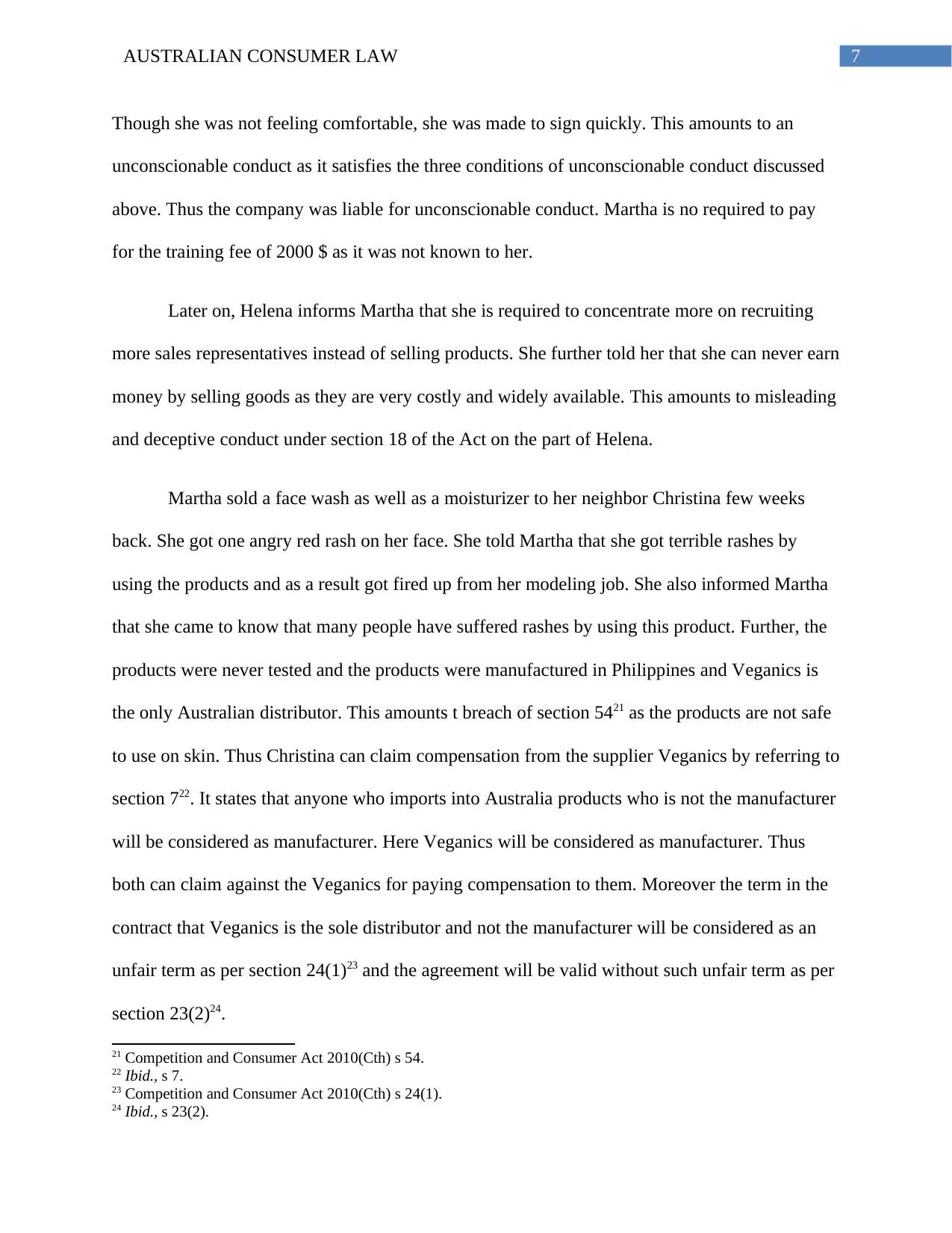
7AUSTRALIAN CONSUMER LAW
Though she was not feeling comfortable, she was made to sign quickly. This amounts to an
unconscionable conduct as it satisfies the three conditions of unconscionable conduct discussed
above. Thus the company was liable for unconscionable conduct. Martha is no required to pay
for the training fee of 2000 $ as it was not known to her.
Later on, Helena informs Martha that she is required to concentrate more on recruiting
more sales representatives instead of selling products. She further told her that she can never earn
money by selling goods as they are very costly and widely available. This amounts to misleading
and deceptive conduct under section 18 of the Act on the part of Helena.
Martha sold a face wash as well as a moisturizer to her neighbor Christina few weeks
back. She got one angry red rash on her face. She told Martha that she got terrible rashes by
using the products and as a result got fired up from her modeling job. She also informed Martha
that she came to know that many people have suffered rashes by using this product. Further, the
products were never tested and the products were manufactured in Philippines and Veganics is
the only Australian distributor. This amounts t breach of section 5421 as the products are not safe
to use on skin. Thus Christina can claim compensation from the supplier Veganics by referring to
section 722. It states that anyone who imports into Australia products who is not the manufacturer
will be considered as manufacturer. Here Veganics will be considered as manufacturer. Thus
both can claim against the Veganics for paying compensation to them. Moreover the term in the
contract that Veganics is the sole distributor and not the manufacturer will be considered as an
unfair term as per section 24(1)23 and the agreement will be valid without such unfair term as per
section 23(2)24.
21 Competition and Consumer Act 2010(Cth) s 54.
22 Ibid., s 7.
23 Competition and Consumer Act 2010(Cth) s 24(1).
24 Ibid., s 23(2).
Though she was not feeling comfortable, she was made to sign quickly. This amounts to an
unconscionable conduct as it satisfies the three conditions of unconscionable conduct discussed
above. Thus the company was liable for unconscionable conduct. Martha is no required to pay
for the training fee of 2000 $ as it was not known to her.
Later on, Helena informs Martha that she is required to concentrate more on recruiting
more sales representatives instead of selling products. She further told her that she can never earn
money by selling goods as they are very costly and widely available. This amounts to misleading
and deceptive conduct under section 18 of the Act on the part of Helena.
Martha sold a face wash as well as a moisturizer to her neighbor Christina few weeks
back. She got one angry red rash on her face. She told Martha that she got terrible rashes by
using the products and as a result got fired up from her modeling job. She also informed Martha
that she came to know that many people have suffered rashes by using this product. Further, the
products were never tested and the products were manufactured in Philippines and Veganics is
the only Australian distributor. This amounts t breach of section 5421 as the products are not safe
to use on skin. Thus Christina can claim compensation from the supplier Veganics by referring to
section 722. It states that anyone who imports into Australia products who is not the manufacturer
will be considered as manufacturer. Here Veganics will be considered as manufacturer. Thus
both can claim against the Veganics for paying compensation to them. Moreover the term in the
contract that Veganics is the sole distributor and not the manufacturer will be considered as an
unfair term as per section 24(1)23 and the agreement will be valid without such unfair term as per
section 23(2)24.
21 Competition and Consumer Act 2010(Cth) s 54.
22 Ibid., s 7.
23 Competition and Consumer Act 2010(Cth) s 24(1).
24 Ibid., s 23(2).
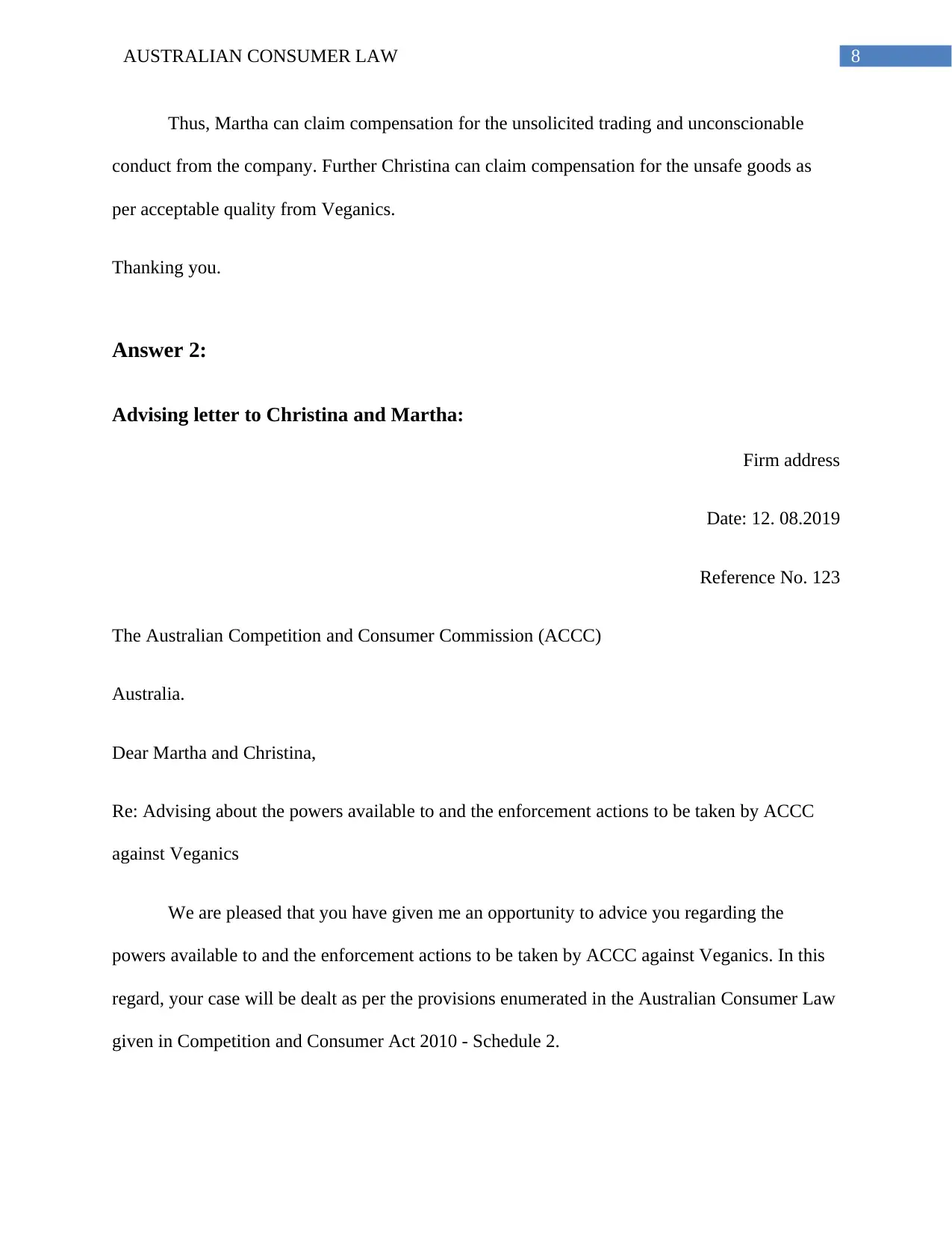
8AUSTRALIAN CONSUMER LAW
Thus, Martha can claim compensation for the unsolicited trading and unconscionable
conduct from the company. Further Christina can claim compensation for the unsafe goods as
per acceptable quality from Veganics.
Thanking you.
Answer 2:
Advising letter to Christina and Martha:
Firm address
Date: 12. 08.2019
Reference No. 123
The Australian Competition and Consumer Commission (ACCC)
Australia.
Dear Martha and Christina,
Re: Advising about the powers available to and the enforcement actions to be taken by ACCC
against Veganics
We are pleased that you have given me an opportunity to advice you regarding the
powers available to and the enforcement actions to be taken by ACCC against Veganics. In this
regard, your case will be dealt as per the provisions enumerated in the Australian Consumer Law
given in Competition and Consumer Act 2010 - Schedule 2.
Thus, Martha can claim compensation for the unsolicited trading and unconscionable
conduct from the company. Further Christina can claim compensation for the unsafe goods as
per acceptable quality from Veganics.
Thanking you.
Answer 2:
Advising letter to Christina and Martha:
Firm address
Date: 12. 08.2019
Reference No. 123
The Australian Competition and Consumer Commission (ACCC)
Australia.
Dear Martha and Christina,
Re: Advising about the powers available to and the enforcement actions to be taken by ACCC
against Veganics
We are pleased that you have given me an opportunity to advice you regarding the
powers available to and the enforcement actions to be taken by ACCC against Veganics. In this
regard, your case will be dealt as per the provisions enumerated in the Australian Consumer Law
given in Competition and Consumer Act 2010 - Schedule 2.
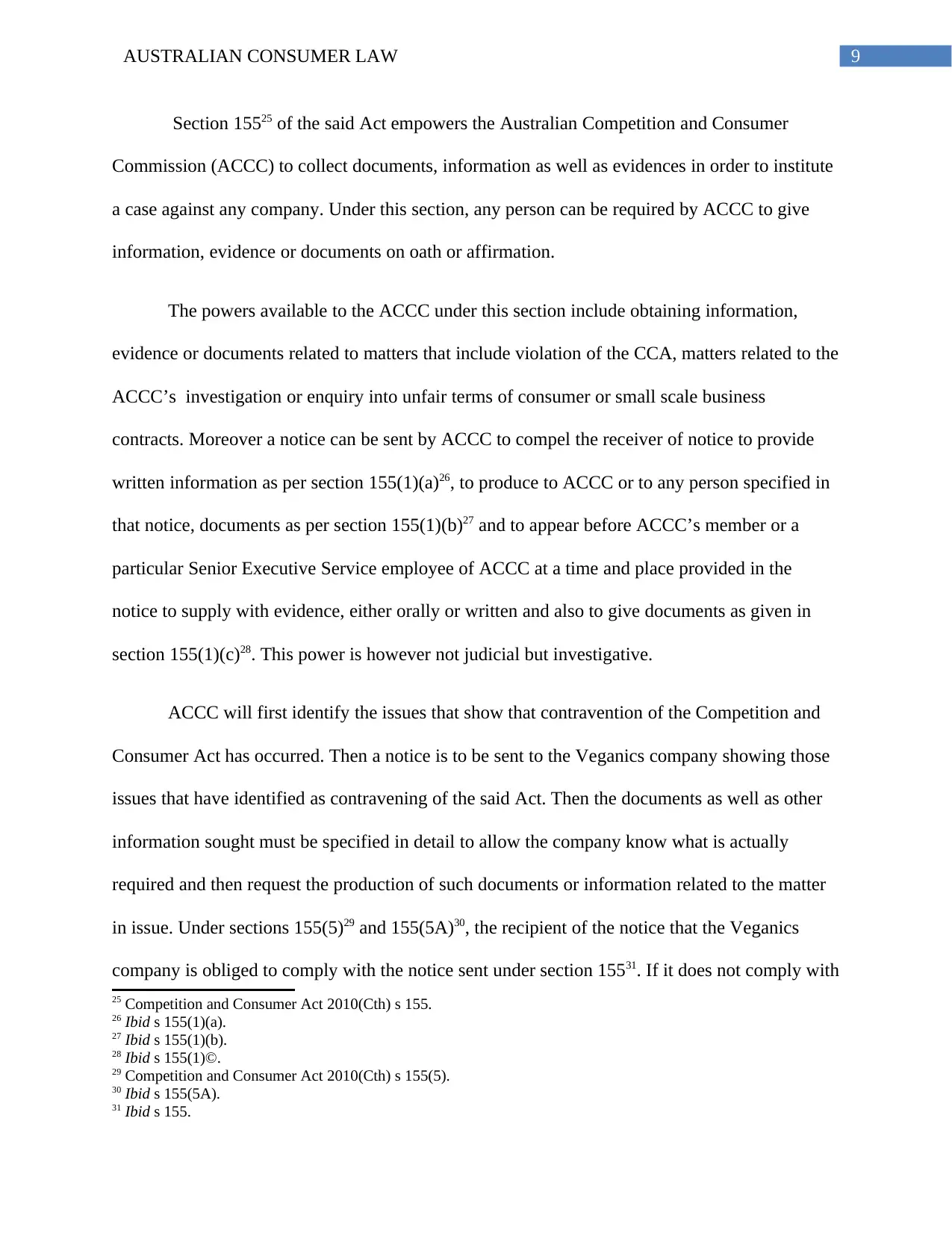
9AUSTRALIAN CONSUMER LAW
Section 15525 of the said Act empowers the Australian Competition and Consumer
Commission (ACCC) to collect documents, information as well as evidences in order to institute
a case against any company. Under this section, any person can be required by ACCC to give
information, evidence or documents on oath or affirmation.
The powers available to the ACCC under this section include obtaining information,
evidence or documents related to matters that include violation of the CCA, matters related to the
ACCC’s investigation or enquiry into unfair terms of consumer or small scale business
contracts. Moreover a notice can be sent by ACCC to compel the receiver of notice to provide
written information as per section 155(1)(a)26, to produce to ACCC or to any person specified in
that notice, documents as per section 155(1)(b)27 and to appear before ACCC’s member or a
particular Senior Executive Service employee of ACCC at a time and place provided in the
notice to supply with evidence, either orally or written and also to give documents as given in
section 155(1)(c)28. This power is however not judicial but investigative.
ACCC will first identify the issues that show that contravention of the Competition and
Consumer Act has occurred. Then a notice is to be sent to the Veganics company showing those
issues that have identified as contravening of the said Act. Then the documents as well as other
information sought must be specified in detail to allow the company know what is actually
required and then request the production of such documents or information related to the matter
in issue. Under sections 155(5)29 and 155(5A)30, the recipient of the notice that the Veganics
company is obliged to comply with the notice sent under section 15531. If it does not comply with
25 Competition and Consumer Act 2010(Cth) s 155.
26 Ibid s 155(1)(a).
27 Ibid s 155(1)(b).
28 Ibid s 155(1)©.
29 Competition and Consumer Act 2010(Cth) s 155(5).
30 Ibid s 155(5A).
31 Ibid s 155.
Section 15525 of the said Act empowers the Australian Competition and Consumer
Commission (ACCC) to collect documents, information as well as evidences in order to institute
a case against any company. Under this section, any person can be required by ACCC to give
information, evidence or documents on oath or affirmation.
The powers available to the ACCC under this section include obtaining information,
evidence or documents related to matters that include violation of the CCA, matters related to the
ACCC’s investigation or enquiry into unfair terms of consumer or small scale business
contracts. Moreover a notice can be sent by ACCC to compel the receiver of notice to provide
written information as per section 155(1)(a)26, to produce to ACCC or to any person specified in
that notice, documents as per section 155(1)(b)27 and to appear before ACCC’s member or a
particular Senior Executive Service employee of ACCC at a time and place provided in the
notice to supply with evidence, either orally or written and also to give documents as given in
section 155(1)(c)28. This power is however not judicial but investigative.
ACCC will first identify the issues that show that contravention of the Competition and
Consumer Act has occurred. Then a notice is to be sent to the Veganics company showing those
issues that have identified as contravening of the said Act. Then the documents as well as other
information sought must be specified in detail to allow the company know what is actually
required and then request the production of such documents or information related to the matter
in issue. Under sections 155(5)29 and 155(5A)30, the recipient of the notice that the Veganics
company is obliged to comply with the notice sent under section 15531. If it does not comply with
25 Competition and Consumer Act 2010(Cth) s 155.
26 Ibid s 155(1)(a).
27 Ibid s 155(1)(b).
28 Ibid s 155(1)©.
29 Competition and Consumer Act 2010(Cth) s 155(5).
30 Ibid s 155(5A).
31 Ibid s 155.
Secure Best Marks with AI Grader
Need help grading? Try our AI Grader for instant feedback on your assignments.
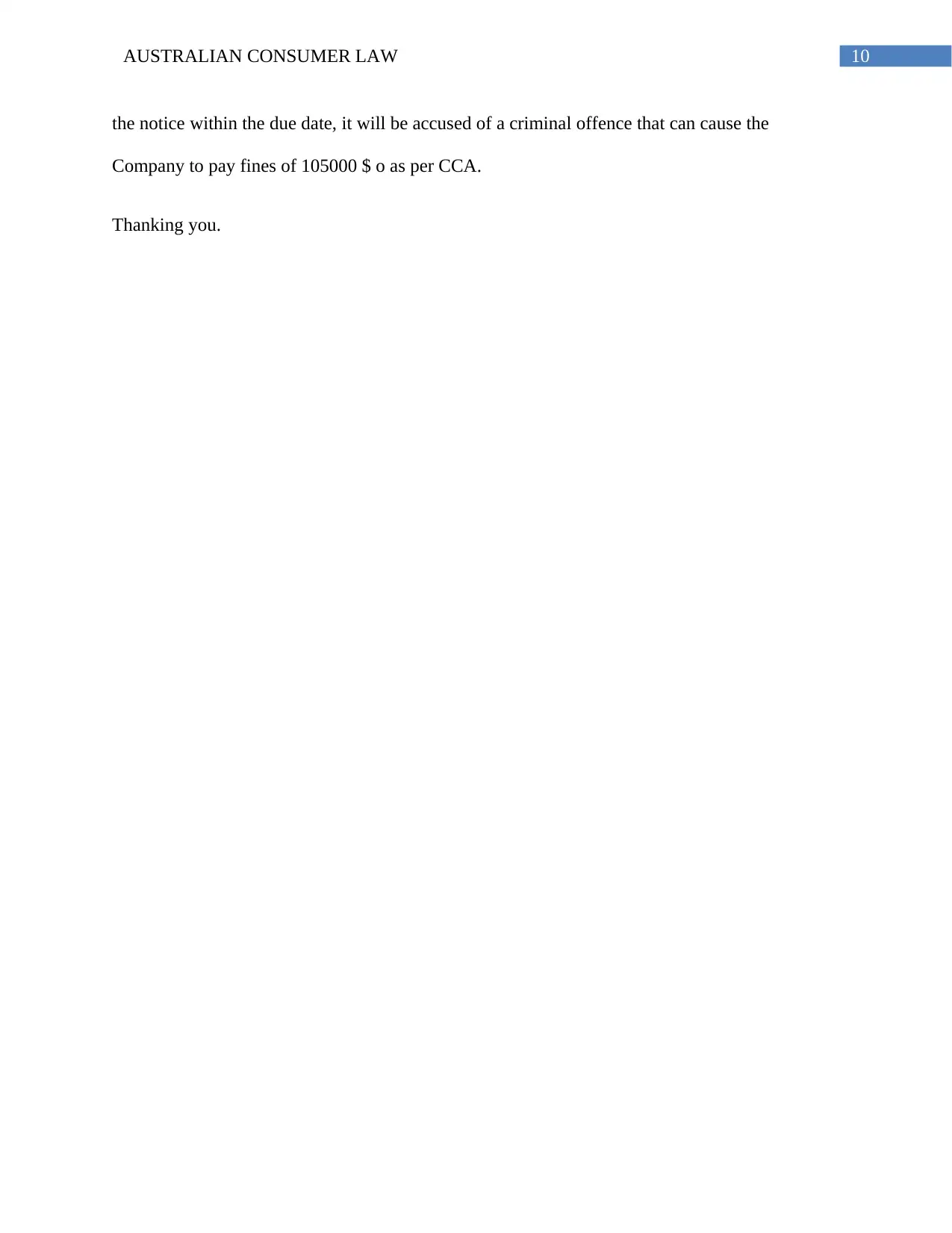
10AUSTRALIAN CONSUMER LAW
the notice within the due date, it will be accused of a criminal offence that can cause the
Company to pay fines of 105000 $ o as per CCA.
Thanking you.
the notice within the due date, it will be accused of a criminal offence that can cause the
Company to pay fines of 105000 $ o as per CCA.
Thanking you.
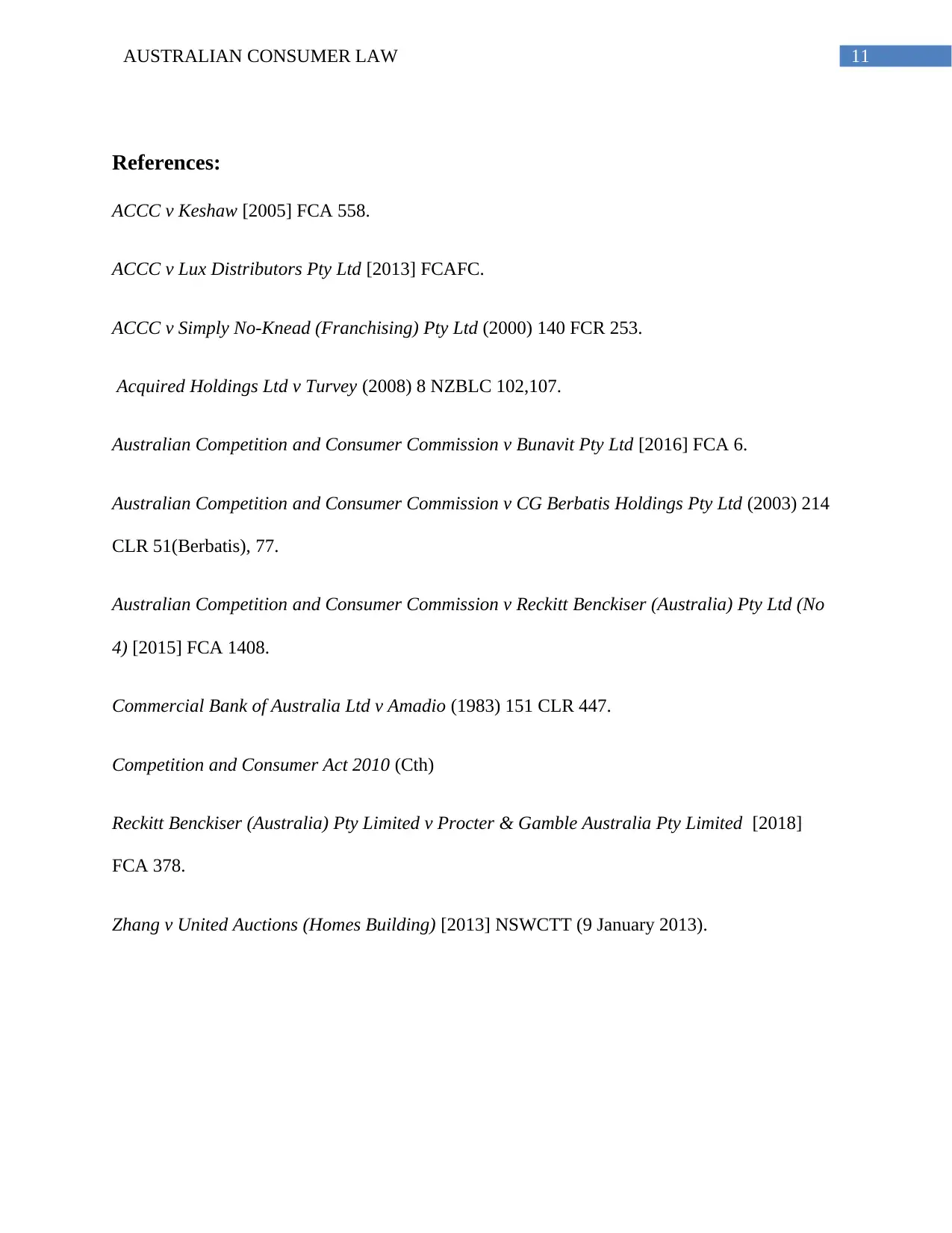
11AUSTRALIAN CONSUMER LAW
References:
ACCC v Keshaw [2005] FCA 558.
ACCC v Lux Distributors Pty Ltd [2013] FCAFC.
ACCC v Simply No-Knead (Franchising) Pty Ltd (2000) 140 FCR 253.
Acquired Holdings Ltd v Turvey (2008) 8 NZBLC 102,107.
Australian Competition and Consumer Commission v Bunavit Pty Ltd [2016] FCA 6.
Australian Competition and Consumer Commission v CG Berbatis Holdings Pty Ltd (2003) 214
CLR 51(Berbatis), 77.
Australian Competition and Consumer Commission v Reckitt Benckiser (Australia) Pty Ltd (No
4) [2015] FCA 1408.
Commercial Bank of Australia Ltd v Amadio (1983) 151 CLR 447.
Competition and Consumer Act 2010 (Cth)
Reckitt Benckiser (Australia) Pty Limited v Procter & Gamble Australia Pty Limited [2018]
FCA 378.
Zhang v United Auctions (Homes Building) [2013] NSWCTT (9 January 2013).
References:
ACCC v Keshaw [2005] FCA 558.
ACCC v Lux Distributors Pty Ltd [2013] FCAFC.
ACCC v Simply No-Knead (Franchising) Pty Ltd (2000) 140 FCR 253.
Acquired Holdings Ltd v Turvey (2008) 8 NZBLC 102,107.
Australian Competition and Consumer Commission v Bunavit Pty Ltd [2016] FCA 6.
Australian Competition and Consumer Commission v CG Berbatis Holdings Pty Ltd (2003) 214
CLR 51(Berbatis), 77.
Australian Competition and Consumer Commission v Reckitt Benckiser (Australia) Pty Ltd (No
4) [2015] FCA 1408.
Commercial Bank of Australia Ltd v Amadio (1983) 151 CLR 447.
Competition and Consumer Act 2010 (Cth)
Reckitt Benckiser (Australia) Pty Limited v Procter & Gamble Australia Pty Limited [2018]
FCA 378.
Zhang v United Auctions (Homes Building) [2013] NSWCTT (9 January 2013).
1 out of 12
Related Documents
Your All-in-One AI-Powered Toolkit for Academic Success.
+13062052269
info@desklib.com
Available 24*7 on WhatsApp / Email
![[object Object]](/_next/static/media/star-bottom.7253800d.svg)
Unlock your academic potential
© 2024 | Zucol Services PVT LTD | All rights reserved.




![Australian Competition and Consumer Commission v Bunavit Pty Ltd [2016] FCA 6](/_next/image/?url=https%3A%2F%2Fdesklib.com%2Fmedia%2Fbunavit-pty-ltd-case_page_2.jpg&w=256&q=75)
